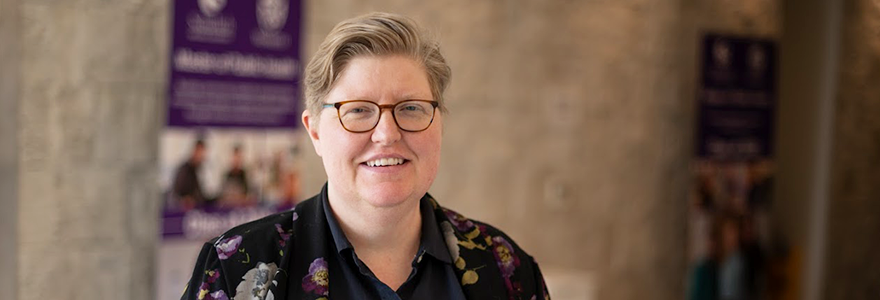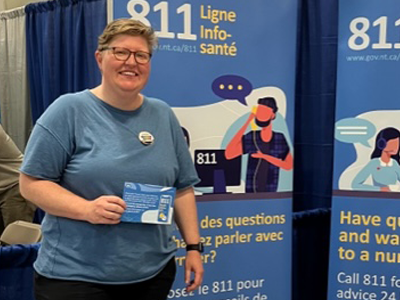Consulting skills and public health enable master’s student to give back to the community
 Returning to school after 15 years, Jennifer Jones was able to apply her experience in business and consulting through
Returning to school after 15 years, Jennifer Jones was able to apply her experience in business and consulting through
the Master of Public Health program's case-based learning method (Photo: Mac Lai/Schulich Medicine & Dentistry photo)
By Cam Buchan
The answer to how Jennifer Jones arrived at the Master of Public Health (MPH) program at the Schulich School of Medicine & Dentistry is deceivingly simple: To find out how the world works, you have to travel many paths.
Jones, who comes from Stratford, Ontario, finished her undergraduate degree in history at Queen’s University in 2004, and international development was a big part of her interest in that program. The lectures and readings showed her the historical and political context behind the development of many countries.
“I focused my research on Southeast Asia, but I’ve always been interested in the world, and how it works,” said Jones, whose varied career spanned 15 years, including stops in human resources at KPMG, a tech startup that focused on information technology before eventually moving to the operations and IT side of thehealthline.ca, working on the information and referral areas of the health information platform.
And while interesting enough, her career journey didn’t answer Jones’ need to know how the world really worked. The questions she investigated in her undergrad years were still on her mind – how have communities developed as they have? Was it the best option for all?
“To that point, my career was fine from a financial perspective and I met some great people and worked on some interesting projects. But it wasn’t very interesting to me and it just ran its course.”
Her next stop was a definitive one.
Jones entered the consulting world, and while there, developed a friendship with a colleague who had previously worked at the California Department of Public Health, who encouraged her to pursue public health as a career option.
After 15 years of work predominantly in IT, she has found a home in the MPH program.
But the real answer to how an historian, HR employee and IT consultant arrives in the world of public health lies in her background in the consulting world.
“All of my IT experience was in the health-care sector,” said Jones. “thehealthline.ca was a health-focused platform and my work in IT consulting was, where I met my colleague, was a leader in public health and IT. And when I went onsite with clients, it was typically in hospitals or municipal health authorities in the U.S.”
While working with a region implementing a digitized health system, she realized it was the connection to the greater public good that attracted her to the idea of career in the field. As Jones worked on a project that analyzed the social determinants of health, she realized the connection between her IT experience and public health.
Back to school
Entering school after 15 years in the working world was a challenge. But the MPH case-based learning method took advantage of her experience in business and consulting.
“With cases, you have the opportunity to look at a variety of issues pertaining to public health from a variety of dimensions. It’s very active learning and you rely heavily on your team to help bring out the learning from the cases that are presented in each course.”
 Jones at the Yellowknife Health and Wellness Fair
Jones at the Yellowknife Health and Wellness Fair
handing out information about the 811-health advice
line to residents (supplied photo)
For her practicum placement, Jones spent the summer in Yellowknife, Northwest Territories, working with the city’s Chief Public Health Officer, Dr. Kami Kandola, and her colleagues in the Office of Public Health. Jones worked on a project to evaluate caller data from an 811 – Health Advice Line, launched in November 2022. The non-emergency line gave people in the Territories access to medical advice from a registered nurse. Jones built an analytical dashboard that helped assess trends in caller usage.
She also worked on an evaluation of a Respiratory Syncytial Virus (RSV) prophylaxis program for infants and toddlers in response to a newly approved single injection prophylactic. Her responsibilities included researching population data to identify risk factors for the disease and developing a cost analysis on the effectiveness of the new product’s introduction.
Her choice of destination was partly inspired by her experiences in Nicole Redvers’ Indigenous health course. Redvers, a member of the Deninu Kųę́ First Nation, associate professor in Epidemiology and Biostatistics and Western Research Chair and director of Indigenous Planetary Health, often referenced her experiences growing up in the Northwest Territories in class and was a major influence on Jones.
“I have always been interested in seeing the North and its landscape. I was also interested in learning more about what the Northwest Territories 811 system since I previously had worked in the information and referral sector. I felt that I had relevant experience that I could offer to this project.”
Working with Kandola in the Public Health Office stretched her newly acquired public health knowledge.
“When I was working in the Public Health Office, I quickly realized there are many ways public health professionals can work across disciplines to provide health-care services.”
Going forward, Jones looks to leverage her practicum experience down another new path, into a leadership role in the health-care system.
“I think the one thing I would emphasize in my decision to come into the program and my summer experience was to combine my IT skills in health care with giving something back to the community. Public health has been a good way to do that.”








